Vintage Treasures: Space Opera and Space Odysseys edited by Brian Aldiss
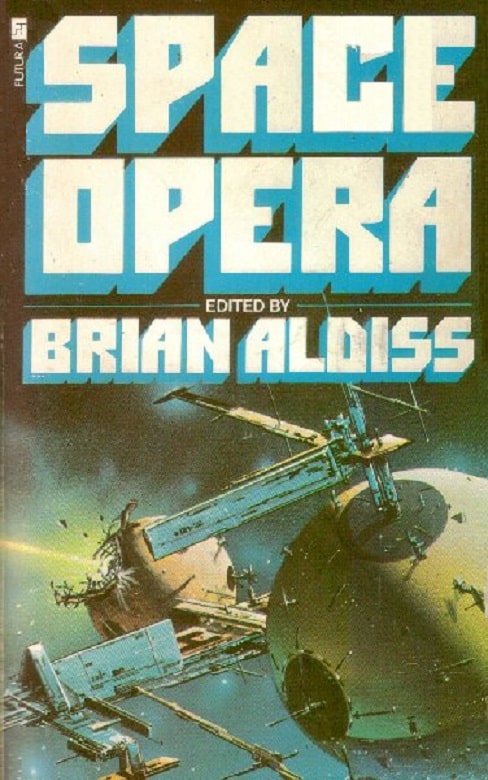 |
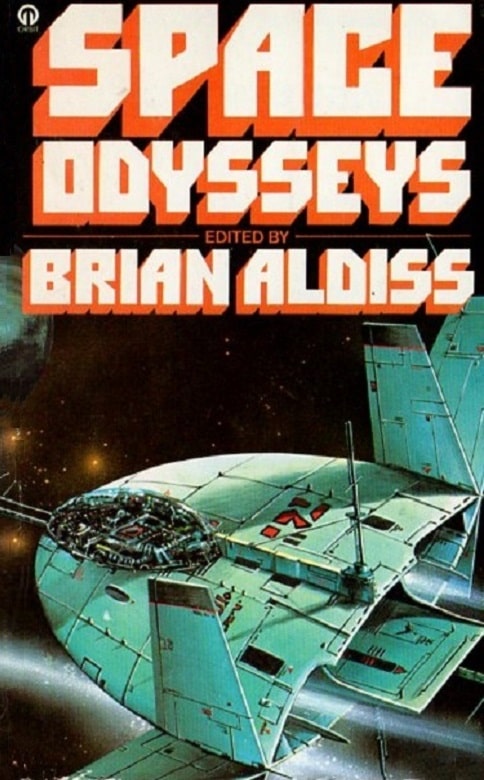 |
Space Opera and Space Odysseys (Futura, July and December 1974). Covers by Eddie Jones
Brian Aldiss had a long and enviable career at the top of the science fiction field, with dozens of novels to his credit, and nearly three dozen collections.
But in his long career he also produced some excellent anthologies. In partnership with Harry Harrison he released nine annual volumes of Best SF (1967-1975), three retrospective titles looking at SF of the 1940s to the 1960s (Decade: The 1940s and its sequels), and fine standalone titles such as The Astounding-Analog Reader and Farewell Fantastic Venus! But on his own he also assembled several terrific volumes, including a few we’ve looked at in the past, including Galactic Empires, Volumes One & Two and Perilous Planets.
Today I want to examine two wonderful paperback anthologies he released in 1974 with Futura in the UK (and later reprinted in the US in incomplete editions): Space Opera and Space Odysseys, which contain stories by Robert Sheckley, Donald Wandrei, Daniel F. Galouye, Edmond Hamilton, James E. Gunn, Philip K. Dick, Leigh Brackett, Ray Bradbury, Jack Vance, A. E. van Vogt, Charles Harness, Randall Garrett, Isaac Asimov, Fredric Brown, Arthur C. Clarke, Edward E. Smith, Alfred Bester, Frank Belknap Long, James Tiptree, Jr. Ross Rocklynne, F. M. Busby, Poul Anderson, Walter M. Miller, Jr., and many others.
[Click the images to see versions that require more Space.]
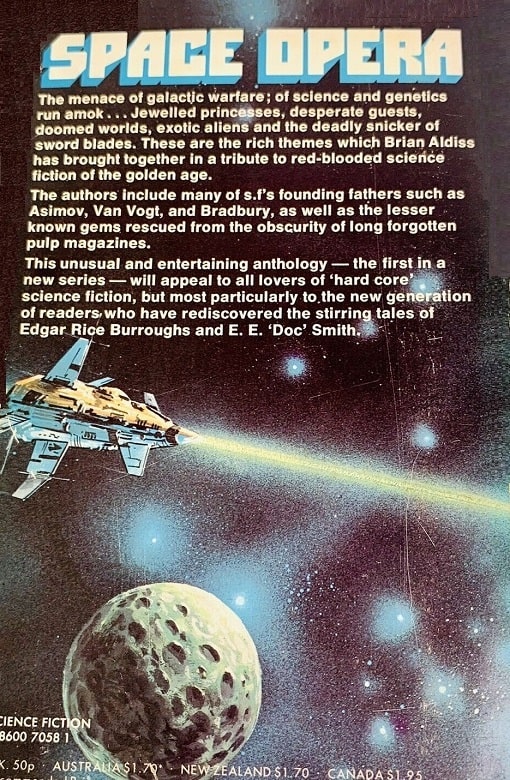 |
 |
Space Opera (Futura, July 1974). Cover by Eddie Jones
As Aldiss says in his Introduction to Space Opera,
Science fiction is for real. Space Opera is for fun.
and both of these anthologies very much reflect the fun, adventurous side of science fiction, with pulp-era SF from Leigh Brackett, Donald Wandrei, Edmond Hamilton, A. E. van Vogt, Jack Vance, E.E. “Doc” Smith, Ross Rocklynne, and Frank Belknap Long, as well as more modern SF in the same spirit from James Tiptree, Jr., F.M. Busby, and others.
Speculiction has an entertaining review of Space Opera from 2019; here’s a sample.
Aldiss describes Space Opera as an anthology of sixteen stories which are lesser-known, i.e. not widely re-published (if at all) but yet retain the flavor of what readers expect seeing the words ‘space opera’. The likes of E.E. Doc Smith and Edgar Rice Burroughs set aside for the moment, Aldiss instead looks to writers like Ray Bradbury, Robert Sheckley, Daniel Galouye, Thomas Scortia, and many others, not all of whom are typically associated with the sub-genre…
The opposite of what most readers would consider space opera, “Zirn Left Unguarded, the Jenghik Palace in Flames, Jon Westerley Dead” by Robert Sheckley nevertheless is a bit of the medium. Peering through the cracks and putting the pieces together, one comes upon a classic, pulp era tale, deconstructed for the modern (New Wave) reader, and is thus sure to raise the hackles of the tried-and-true Gernsbackian reader looking for fluff, but pique the interest of the next generation’s reader looking for more substance. A strong precursor to Philip K. Dick before there was Philip K. Dick, Daniel F. Galouye’s “Tonight the Sky Will Fall” tells of an up-and-coming executive who seems to have strangers around him, preventing evil from befalling him. But why? Galouye stringing out the mystery nicely, the resolution actually becomes for Le Guinian than Dickian.
As classic as classic can be, “The Star of Life” by Edmond Hamilton tells of a space mission gone wrong. Later expanded into a novel, the short story is packed with character interaction that ends on a surprise note. Another classic premise resolved in classic fashion, “Breaking Point” by James E. Gunn tells of a space crew who land on an alien planet, only to have their expectations of reality take a left turn — several in fact. Getting to the bottom of the mystery requires a 50s sf mindset. Pulling a cheap trick but written superbly, “All Summer in a Day” by Ray Bradbury tells of a very special school day on Venus, and the misfortune of one of the kids. Again, beautifully written — with an emotional cheap shot.
Man vs. robot in super-space opera technicolor, “The Storm” by A. E. van Vogt tells of the universe’s greatest space ship and its encounter with an enclave of robots bent on remaining hidden, all the while a massive galactic storm bears down on the inevitable conflict. Suffice to say, the story is a small slice of a wide-angle angle sub-genre, written in van Vogt’s shotgun diction.
Read the whole thing here.
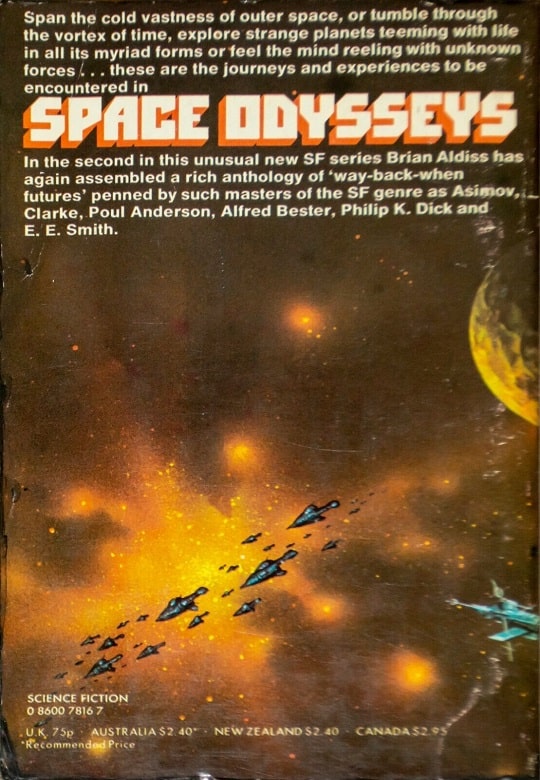 |
 |
Space Odysseys (Futura, December 1974). Cover by Eddie Jones
My favorite review of Space Odysseys comes from Peter Tillman at Goodreads, who writes:
Classic anthology in a series by Brian Aldiss, RIP. Aldiss promises the pure quill in entertaining old SF, and mostly delivers…
• Reason — short story by Isaac Asimov… Asimov was a first-rate storyteller. A new model robot is being tested, to manage an orbital power station. Unexpected problems develop. 3.5 stars.
• Time Is the Traitor — novelette by Alfred Bester. John Strapp makes Decisions, and owns 1% of the world. But he has some SERIOUS kinks…. A classic Bester story that hasn’t dated a bit. 4.5 stars.
• The Impossible Planet — short story by Philip K. Dick. An old, old woman wants to visit Earth, her ancestral home, lost in legend. A space captain obliges. Killer last line. 3+ stars.
• The Unfinished — short story by Frank Belknap Long. A sweet bit of space opera in 11 pages. Recommended. 4 stars.
• And I Awoke and Found Me Here on the Cold Hill’s Side — short story by James Tiptree, Jr. Newest story in the anthology. One of Tiptree’s best, and best known: 5+ stars.
• The Empress of Mars — novelette by Ross Rocklynne. Entertaining old-style fantasy-Martian adventure… It’s a bit over the top, but colorful and fun. 3.5 stars.
• Strange Exodus — short story by Robert Abernathy. An odd story. Strange, gigantic creatures have eaten most everything on Earth. Surviving humans find a way out. 3 stars.
• To Each His Star — short story by Bryce Walton. Four men survived the wreck of the starship. Old Dunbar said he knew the way to a paradise planet. But Old Dunbar was as crazy as a Jovian juke-bird. Good old-fashioned story, 3 stars.
• The Big Hunger — short story by Walter M. Miller, Jr. A prose poem to the Outward Urge, the star craze that populates the galaxy. The folks who like things quiet stay home, the restless, hell-raisers move on. A golden-age classic. 4 stars.
Both Futura editions were reprinted in the US three years after they were published in the UK, though for (presumably) rights reasons, several stories in Space Opera were cut for the US release. The Futura editions are definitely the ones to get, if you can find them.
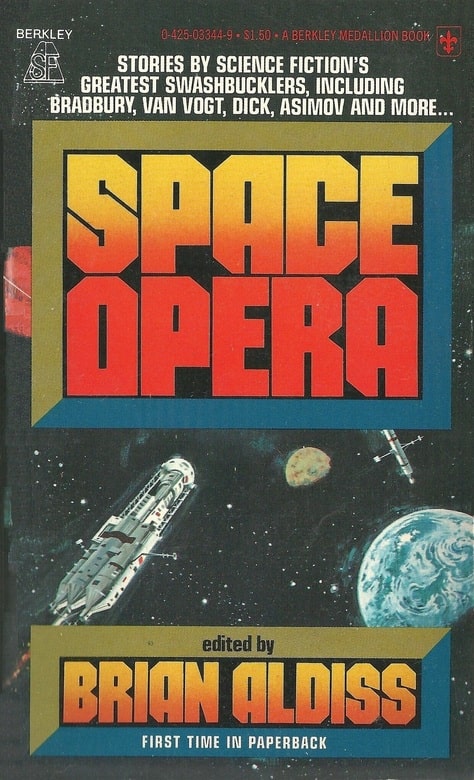 |
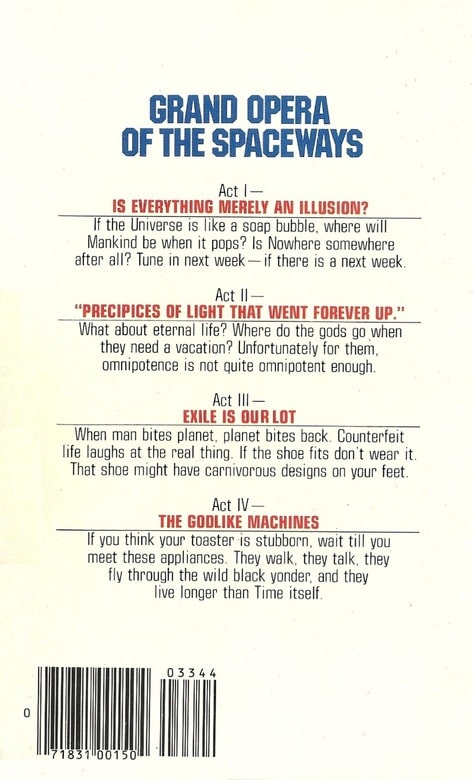 |
Space Opera, US reprint edition (Berkley Medallion, March 1977). Cover by Vincent Di Fate
Both volumes contain lengthy introduction by Brian Aldiss, along with shorter essays interspersed throughout.
Space Opera contains four short essays by Aldis:
Is Everything an Illusion?
Precipices of Light That Went Forever Up….
Exile Is Our Lot
The Godlike Machines
Envoi
It also contains two excerpts: one from A Honeymoon in Space by George Griffith originally serialized in Pearson’s Magazine in the year 1900 (and eventually published as a fixup novel in 1901), and one from Leigh Brackett’s Sword & Planet classic The Sword of Rhiannon. Plus complete stories by Robert Sheckley, Donald Wandrei, Daniel F. Galouye, Edmond Hamilton, Philip K. Dick, Ray Bradbury, Jack Vance, A. E. van Vogt, Charles Harness, Randall Garrett, Isaac Asimov, Fredric Brown, and more.
Here’s the complete Table of Contents for Space Opera.
Introduction by Brian W. Aldiss
“Zirn Left Unguarded, the Jenghik Palace in Flames, Jon Westerley Dead” by Robert Sheckley (Nova 2, 1972)
“The Red Brain” by Donald Wandrei (Weird Tales, October 1927) — Futura edition only
“Tonight the Sky Will Fall” by Daniel F. Galouye (Imagination, May 1952)
“The Star of Life” by Edmond Hamilton (Startling Stories, January 1947)
“After Ixmal” by Jeff Sutton (Amazing Stories, October 1962)
“Sea Change” by Thomas N. Scortia (Astounding Science Fiction, June 1956)
“Breaking Point” by James E. Gunn (Space Science Fiction, March 1953) — Futura edition only
“Colony” Philip K. Dick (Galaxy Science Fiction, June 1953) — US edition only
Excerpt from The Sword of Rhiannon by Leigh Brackett (Thrilling Wonder Stories, June 1949)
“All Summer in a Day” by Ray Bradbury (The Magazine of Fantasy and Science Fiction, March 1954)
“The Mitr” by Jack Vance (Vortex Science Fiction Vol. 1, No. 1, 1953)
“The Storm” by A. E. van Vogt (Astounding Science-Fiction, October 1943)
“The Paradox Men” by Charles Harness (Startling Stories, May 1949)
“Time Fuze” by Randall Garrett (If, March 1954)
“The Last Question” by Isaac Asimov (Science Fiction Quarterly, November 1956)
“Answer” by Fredric Brown (Angels and Spaceships, 1954) — Futura edition only
Space Odysseys survived being cut in the US edition, although I still prefer the Futura edition… mostly for the classic Eddie Jones cover.
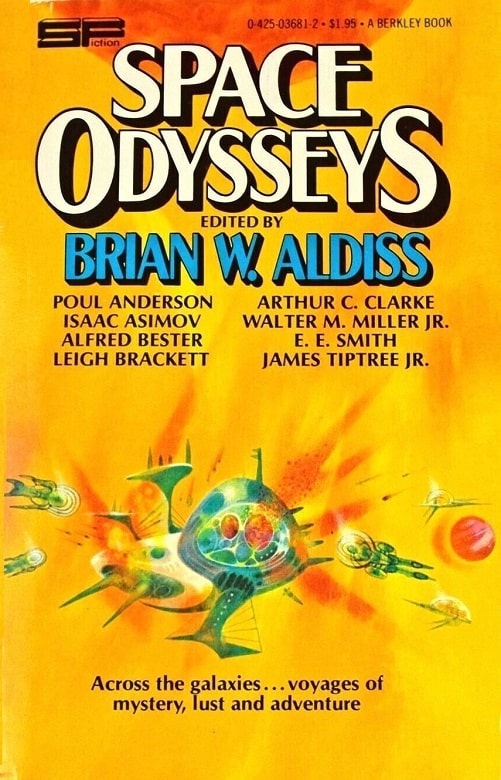 |
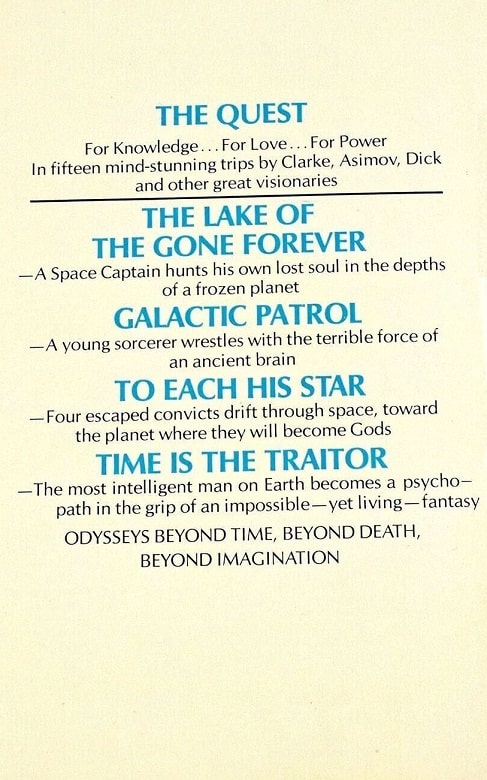 |
Space Odysseys, US reprint edition (Berkley Medallion, April 1978). Cover by Richard Powers
Space Odysseys contains four short essays by Aldiss, each kicking off a section of the book:
Section I: The Search for Knowledge
Section II: The Search for Illusion
Section III: A Pinch of Otherness
Section IV: “A Human Being is the Smallest Thing…”
It also contains Arthur C. Clarke’s classic story “The Sentinel” (the inspiration for the movie 2001: A Space Odyssey), plus an excerpt from Galactic Patrol by E.E. “Doc” Smith, a Psychotechnic League novelette by Poul Anderson, and stories by Leigh Brackett, Isaac Asimov, Alfred Bester, Philip K. Dick, Frank Belknap Long, James Tiptree, Jr., Ross Rocklynne, F. M. Busby, Poul Anderson, Walter M. Miller, Jr., and others.
Here’s the complete TOC for Space Odysseys.
Introduction by Brian W. Aldiss
“The Sentinel” by Arthur C. Clarke (10 Story Fantasy, Spring 1951)
Excerpt from Galactic Patrol by Edward E. Smith (1950)
“The Lake of the Gone Forever” by Leigh Brackett (Thrilling Wonder Stories, October 1949)
“Reason” by Isaac Asimov (Astounding Science-Fiction, April 1941)
“Time Is the Traitor” by Alfred Bester (The Magazine of Fantasy and Science Fiction, September 1953)
“The Impossible Planet” by Philip K. Dick (Imagination, October 1953)
“The Unfinished” by Frank Belknap Long (Super Science Stories, April 1951)
“And I Awoke and Found Me Here on the Cold Hill’s Side” by James Tiptree, Jr. (The Magazine of Fantasy and Science Fiction, March 1972)
“The Empress of Mars” by Ross Rocklynne (Fantastic Adventures, May 1939)
“I’m Going to Get You” by F. M. Busby (Fantastic, March 1974)
“Strange Exodus” by Robert Abernathy (Planet Stories, Fall 1950)
“Star Ship” by Poul Anderson (Planet Stories, Fall 1950)
“To Each His Star” by Bryce Walton (Space Science Fiction, May 1952)
“The Big Hunger” by Walter M. Miller, Jr. (Astounding Science Fiction, October 1952)
“Night Watch” by James Inglis (New Writings in SF 3, 1965)
Aldiss produced several other themed anthologies in the 1970s, including his famous series with Avon (Evil Earths, Galactic Empires, Volumes One and Two, and Perilous Planets).
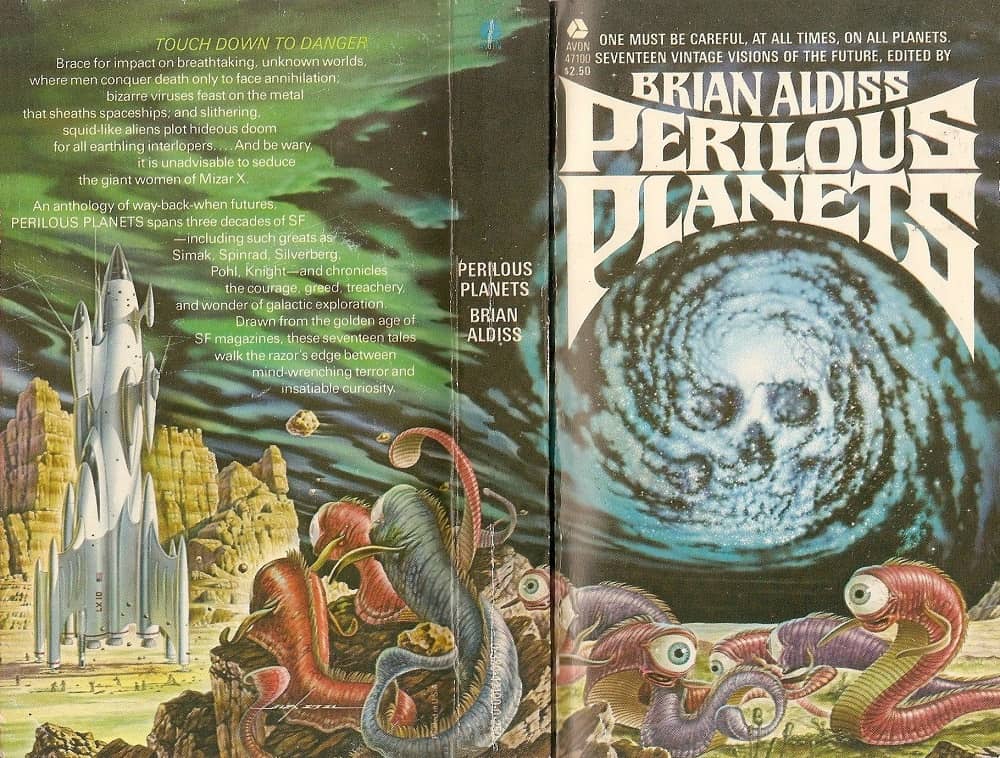 |
Perilous Planets (Avon Books, 1980). Cover by Alex Ebel
Our previous coverage of Brian Aldiss includes:
New Arrivals, Old Encounters by Brian Aldiss
Galactic Empires, Volumes One & Two, edited by Brian Aldiss
The Astounding-Analog Reader edited by Harry Harrison and Brian W. Aldiss
The Year’s Best SF 9, edited by Brian Aldiss and Harry Harrison
Perilous Planets, edited by Brian Aldiss
Birthday Reviews: Brian W. Aldiss’s “Tarzan of the Alps” by Steven H Silver
Farewell Fantastic Venus! edited by Brian W. Aldiss with Harry Harrison
Brian Aldiss, August 18, 1925 — August 19, 2017
Starship/Non-Stop by Brian Aldiss
Bow Down to Nul by Brian W. Aldiss
Hell’s Cartographers, edited by Brian W. Aldiss and Harry Harrison
Here the complete details on the UK Futura editions:
Space Opera (324 pages, £0.50 in paperback, August 1974)
Space Odysseys (324 pages, £0.75 in paperback, December 1974)
Both were paperback originals with covers by Eddie Jones. Both have been out of print since 1978. There are no digital editions.
See all our recent Vintage Treasures here.
John, were there strong precursors to Phillip K Dick after Phillip K Dick?
There’s a science fiction story idea in there somewhere, is there not?
If there’s one writer who could have precursors AFTER he died, it would be Phillip K Dick.
And if that was the premise for an SF tale, I’d definitely want to read it. 🙂
man, talk about what i am in the mood for right now and it’s fun pulpy space romps… boy do i wish these were in e-book form 🙁 now i am just sad haha
Dante,
There’s plenty of affordable paperback copies kicking around of both anthologies! eBay has multiple copies of SPACE OPERA for around 8 bucks (cheaper than a new paperback), most with free shipping.
https://www.ebay.com/sch/i.html?_from=R40&_trksid=p2047675.m570.l1312&_nkw=%22space+opera%22+aldiss&_sacat=0
SPACE ODYSSEYS has fewer paperback copies available, though I do see at least one copy for $7 with free shipping in the middle of this list:
https://www.ebay.com/sch/i.html?_from=R40&_trksid=p2334524.m570.l1313&_nkw=%22space+odysseys%22+aldiss&_sacat=0&LH_TitleDesc=0&_odkw=%22space+odyssey%22+aldiss&_osacat=0
thank you for the work to find these and post them for me, i know you love to scour ebay for stuff anyway, but it is appreciated. i will be honest with you, other then magazines, i dont think i have read a physical book in years, i am so attached to my e-reader it’s crazy, i must own over 1000 books and read maybe 200 of them in the last 3-4 years. i just buy anything i want to read and then have it and no space is taken up. hell i have bought several things only available in physical form you have featured over the last 3 years and havent even read them. i seem to do that a lot, i get more of a kick from aquiring them just to know i have the ability to read them when i want yet dont… i am rambling now, but i do wonder if i am weird for this habit.
“Zirn Left Unguarded, the Jenghik Palace in Flames, Jon Westerly Dead” is by a wide margin my favorite title of all time!
“The Paradox Men” must be a short excerpt from the novel, and as such should be dated 1974, as I imagine this anthology is the first time it appeared in that form. It was published as “Flight Into Yesterday” in Startling Stories, May 1949; and under the same title, largely the same text, in hardcover in 1953. The first use of the now standard title THE PARADOX MEN was in the Ace Double version, 1955 (a very slightly revised text.)
SPACE OPERA, and also GALACTIC EMPIRES, volumes I and II, were formative anthologies for me back in my teenage years. Brian Aldiss was a truly major figure in SF, in many different ways.
> “Zirn Left Unguarded, the Jenghik Palace in Flames, Jon Westerly Dead” is by a wide margin my favorite title of all time!
Rich,
I can’t argue with you there! I flipped to that story and read it immediately the first time I sat down with SPACE OPERA.
The story is good, though it doesn’t live up to the stellar promise of that title. 🙂
> “The Paradox Men” must be a short excerpt from the novel…
I can’t tell? The Table of Contents doesn’t list it as an excerpt. Neither does IMDB, but they also list SPACE OPERA as the sole place where this version was published, which tells me it’s probably an excerpt of some kind:
https://www.isfdb.org/cgi-bin/title.cgi?286661
It’s a 32-page novelette. The copyright page seems to suggest it’s a version of the 164-page novel that appeared in STARTLING STORIES in May 1949.
IMDB has this notation on the novel version:
“According to “The Encyclopedia of Science Fiction”, the magazine version was expanded for book publication.
Charles L. Harness made the following comment about this work’s title in the preface for Station Ganymede:
‘Donald Wollheim did me a big favor in providing a good title for my first novel. As submitted to Startling Stories I called it “Toynbee 22.” Sam Merwin objected to that, he said nobody would understand it, and he published the story as “Flight into Yesterday.” Several years later Donald brought it out as a paperback as The Paradox Men. Even more incomprehensible, but it turned out to be irresistible, and I’ve stayed with it for all subsequent editions.'”
See:
https://www.isfdb.org/cgi-bin/title.cgi?4862
John,
I’ve actually read all three versions of Flight Into Yesterday/The Paradox Men — the 1953 version is slightly expanded from the 1949 magazine version (56,000 to 60,000 words) and the 1981 version, part of Crown’s Classics in Science Fiction series, is revised again, to about 64,000 words with some probably unnecessary “updates” such as the Microfilm Mind becoming the Meganet Mind.
My review: http://rrhorton.blogspot.com/2017/05/an-old-ace-double-paradox-men-by.html
I have all of these Aldiss anthologies (moat of them in the fabulously-covered Avon paperback editions) and I wouldn’t part with them for love nor money.
Thomas,
I know exactly what you means! Aldiss’ Avon anthologies came out in 1978-1980, but I totally missed them (maybe they weren’t distributed in Canada?) When I first saw them 20 years later (in an online listing in the late 90s, I think) I was frantic to track them all down. Alex Ebel’s covers are truly marvelous.
Space Opera was another childhood staple via the public library — I’m pretty sure it was the Doubleday hardcover, although I wouldn’t necessarily put money on it.
https://www.isfdb.org/cgi-bin/pl.cgi?254835
Again I’m reminded that I really need to read or reread all six anthologies — these two and the four Avons.
The Doubleday hardcover is by far the most common edition for sale online (at Abe Books and eBay). Prices are still very reasonable.
If I were to start another Aldiss anthology re-read (which seems inevitable), I think I’d start with Farewell, Fantastic Venus!.